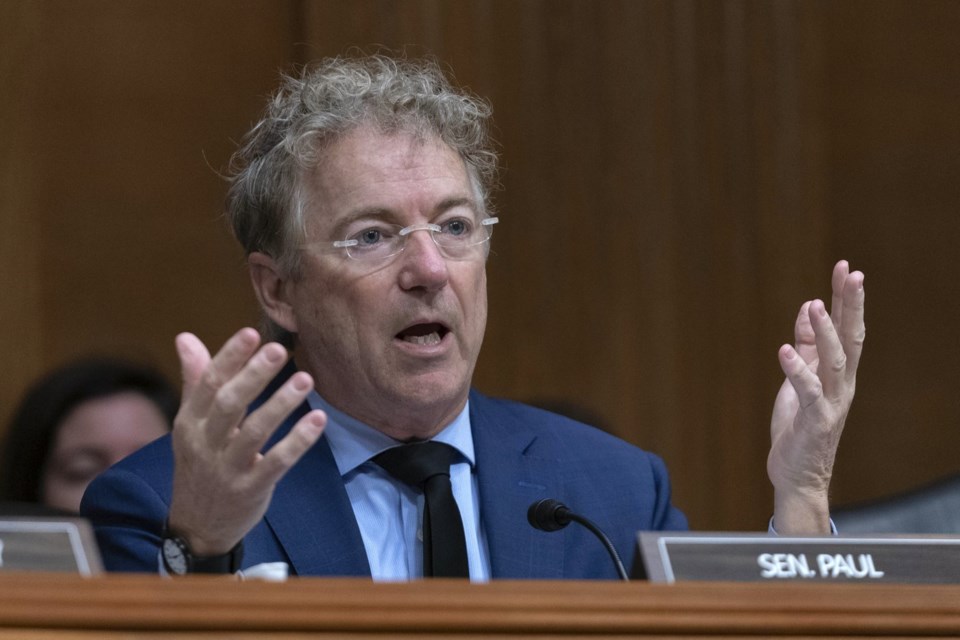LOUISVILLE, Ky. (AP) ã In solidly Republican Kentucky, resistance to President Donald Trump's has sprung up from a cross-section of key business sectors, GOP Sen. Rand Paul said Monday.
Paul said he's heard concerns from agriculture, the auto sector, , home building and package shipping in response to Trump's aggressive use of tariffs. Paul ã among the few GOP senators willing to challenge Trump on tariffs ã met with a group of Louisville business leaders on Monday.
"Virtually every business that I have met in Kentucky has said theyãre not excited about having tariffs and that international trade has been good for their company and good for the consumer by bringing lower prices,ã the libertarian-leaning Paul told reporters afterward.
Paul welcomed the sudden de-escalation of the , when the two global economic powerhouses agreed Monday to slash their massive recent tariffs. The 90-day truce creates time for U.S. and Chinese negotiators to reach a more substantive agreement.
As for prospects of a longer-term deal, the senator said: "Weãll see how it shakes out.ã
ãAnything we can do to bring down tariffs is good,ã Paul said. ãI said Iãll be the first person to compliment President Trump if the end of this shakes out and in six months, all the tariffs are lower and thereãs more trade. Iãm perfectly willing and big enough to say: ãGood job, Mr. President.ãã
Trump used tariffs in his first term and has been even more aggressive and unpredictable about imposing them in his second. Heãs slapped a 10% tariff on a myriad of countries, that had governed global trade for decades.
Trump dominated Kentucky in each presidential election since 2016, but the GOP lawmakers willing to speak out against his trade wars include Paul and Sen. Mitch McConnell.
Trump's tariffs forged a rare among the senators and Democratic Gov. Andy Beshear. They raised concerns that trade wars would drive up prices for consumers and damage key business sectors, including the bourbon industry. , some liquor stores cleared American spirits from their shelves amid trade acrimony and Trumpãs calls to make Canada the 51st state.
Trump views tariffs as an all-purpose economic tool that can raise money for the U.S. Treasury, protect American industries, lure factories to the United States and pressure other countries to bend to his will, even on issues such as immigration and drug trafficking.
Paul, who ran for president in 2016, has called for on the issue.
ãTariffs are taxes, and the power to tax belongs to Congress ã not the president," Paul said in a release last month. ãOur Founders were clear: tax policy should never rest in the hands of one person.ã
Asked Monday if he trusts the president's tactics on trade, Paul replied: "I would prefer we werenãt putting tariffs on.ã
Paul also raised concerns about the on-again, off-again nature of Trump's tariff policies, noting that ãbusinesses like certainty.ã
ãItãs really why most of us who believe in the free market think that government shouldnãt be involved in so many decisions," he said. ãThese are the decisions that should be left to the marketplace to determine prices."
Among the business leaders who met with Paul on Monday was Sarah Davasher-Wisdom, CEO of Greater Louisville Inc., the metro chamber of commerce in Kentucky's largest city. Participants updated the senator on what impacts the tariffs are having on their businesses, she told reporters.
ãThe tariffs are creating a lot of uncertainty for businesses, and that makes it very difficult to operate. And itãs driving up prices,ã she said. ãAnd the uncertainty itself is making it difficult for businesses to plan capital expenditures, making it difficult for them to plan out 90 days, 120 days.ã
Bruce Schreiner, The Associated Press



